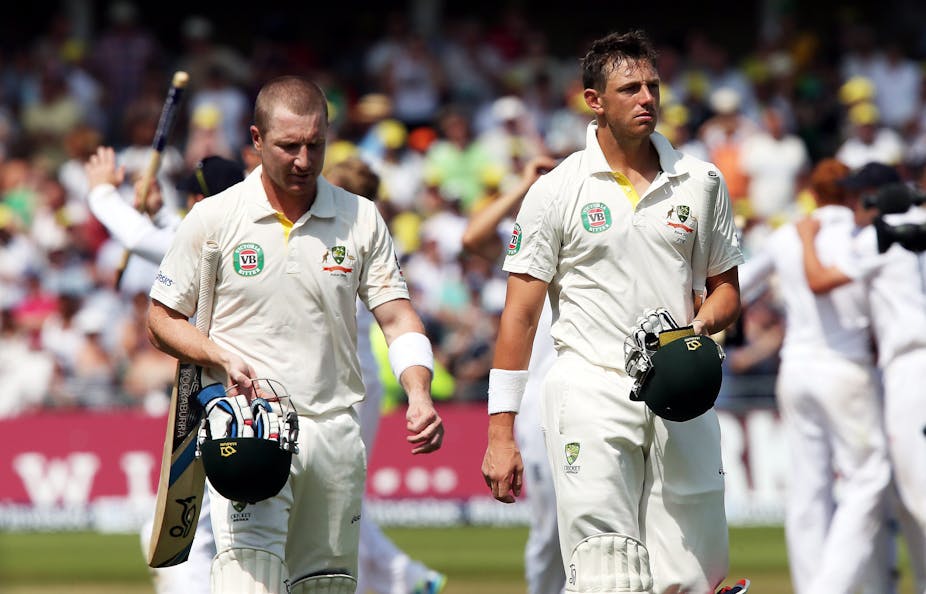The first Ashes Test was indeed a veritable thriller. England edged Australia by a mere 14 runs, after an absorbing four-and-a-half days of action to go one-up in the best-of-five series. For those not well versed on the sport, only a dozen or so of more than 2000 Tests dating back to 1877 have been decided by fewer runs.
Partly because of the closeness of the match, much of the media focus has centred on decision outcomes arising from the Decision Review System (DRS). This system, which allows up to two incorrect challenges per innings, is in economic terms a resource like any other – a scarce one, and one to be used, lest it be lost.
Opening with a disclaimer, I have absolutely no sympathy for my team here. No Australian cricket fans were complaining back in the pre-DRS era in 2008 when the Andrew Symonds incident in Sydney arguably turned the entire series against India in Australia’s favour. I could even excuse Doug Bollinger for his infamous dummy spit in Adelaide a couple of summers later against the West Indies when the system was still in its infancy, but by now there is no longer any excuse for such irrationality.
What is not in dispute is that the DRS has significantly reduced the incidents of incorrect umpiring decisions being allowed to effectively stand, relative to the previous status quo. This is also true in tennis, yet the consensus is that it works perfectly well in that sport. This helps tell the economist in me that there is very little, if anything at all, wrong with the system itself in cricket. But try telling that to various print and broadcast journalists.
Many local scribes over the weekend into today have sadly succumbed to the temptation to pander to the masses of their readership. Since Australian fans want to have our spleen vented in one united voice right now (among other ways) by reading what we want to hear – that “we woz robbed” – sports writers have a strong incentive to serve up precisely that, even if it misses the entire point.
As an economist, of ultimate policy-related importance is that what the DRS did was to re-assign some (albeit small) proportion of decision-making power from the umpires to the players themselves. But what is being ignored in the DRS discourse is the commensurate responsibility that comes with that power.
Sure, Aleem Dar’s third-day call on Stuart Broad was indeed a howler, and that wasn’t the only injustice served up by the men in white during this Test either. But why is it that no-one seems to be willing to give Australian captain Michael Clarke and his men the unconditional lambasting they deserve for wilfully squandering their unsuccessful challenges like a bunch of drunken sailors on tour?
An argument here might be to say that (former Australian wicketkeeper Adam Gilchrist’s views on walking aside) professional athletes cannot be trusted for complete honesty anyway. So why bother holding them to account like we have always done to the umpires?
However, this argument is weak at best. In fact, if I were Stuart Broad, I too would have defiantly stood my ground. What’s more, rather than looking sheepish about it, I would have backed it up by giving the Australian players a right old bollocking – or perhaps sledging – telling them (in laymen’s terms) that if they were not so systematically and profligately quick on the trigger with their challenges, I’d be back in the pavilion by now…so suck it up, laddies!
Even more worrying was that the harsh lessons from the third innings of the match were not heeded in the final innings, when Australia once again exhausted their challenges early on (though they had already benefited once from one correct challenge). Imagine if Brad Haddin had not actually nicked the ball, yet were incorrectly shown the index finger.
Economics, particularly on the micro side, is about decision-making. I am yet to meet a cricket-loving microeconomist who thinks the DRS is anything but a solid system with an appropriate treatment given to incentives and strategy.
It is just a pity that the Australian cricketers have not yet woken up to their responsibility of mastering the art of rationality around it, and that commentators and writers have not yet learned to correctly apportion the fair share of the blame on the players for the so-called injustices that can still arise under the system.

